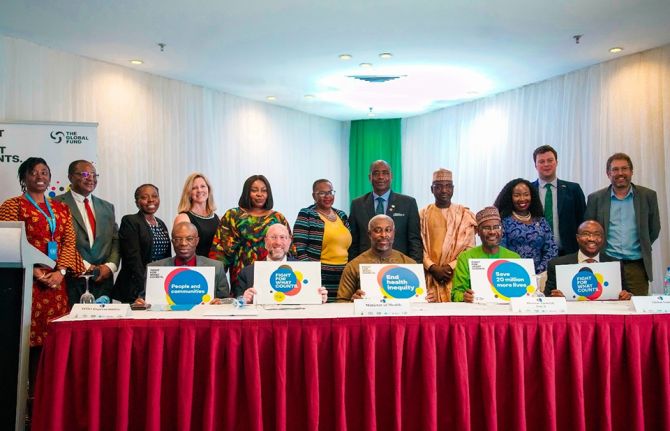

Feature Story
Nigeria calls for a successful 7th Global Fund Replenishment
12 September 2022
12 September 2022 12 September 2022Nigeria has hosted a meeting of key stakeholders in the country’s HIV and wider health response to call for a successful 7th Global Fund Replenishment meeting. The meeting took place in Abuja and included ambassadors of key donor and recipient countries and heads of United Nations agencies, including UNAIDS.
During the event, the Minister of State for Health, Ekumankama Joseph Nkama, expressed his appreciation for Nigeria’s partnership with the Global Fund to Fight AIDS, tuberculosis and malaria. He said Nigeria included one of the Global Fund’s most important recipients of Global Fund disbursements over the last 20 years and reiterated Nigeria’s commitment to increase domestic funding for health.
‘I applaud countries who have already made their pledges to the Global Fund including the United States, Germany, Japan and Luxemburg,” said Mr Nkama.” I encourage other countries to rise up to this noble call by increasing their pledge by at least 30% to enable the Global Fund to meet its target.” he concluded.
David Green, the United States chargé d’affaires commended the partnership with the Nigeria that had he said enabled an incredible acceleration of HIV treatment coverage, registering the largest treatment growth in the history of the HIV programme, despite the COVID 19 pandemic. This was made possible through national surge and alignment efforts that saw the aligning of technical and financial resources behind a single national programme for intensified case-finding, allowing rapid expansion of access to antiretroviral treatment.
‘Sustaining this success depends upon contributions to the Global Fund and all of us standing in solidarity to fight for what counts. We are close to the finish line, but with Nigeria still accounting for one out of seven children born globally with HIV, the race is not yet over,’ said Mr Green.
For the Global Fund, Linda Mafu, highlighted the importance of Nigeria.
“Nigeria is one of our most important portfolios at the Global Fund and achievement of our ambitious targets is critical both for the health of the people of Nigeria and the ability of the Fund to raise additional funding and make an impact at the global level in saving lives,” she said.
Leo Zekeng, UNAIDS country director reiterated the importance of the Global Fund in the collective global response to end AIDS as a public health threat by 2030 and called on countries to stand in solidarity for a successful 7th Global Fund Replenishment. ‘Investing in global health is not only the right thing to do but the smart thing to do as it guarantees a good return of investment. Every $1 invested in fighting AIDS, TB and malaria yields $31 in health and economic returns,” he added.
The Global Fund investment case of the 7th Replenishment conference was presented to those attending the meeting, highlighting the achievements of the investments and the remaining gaps in reducing the burden of HIV, tuberculosis and malaria. The 7th Global Fund Replenishment conference seeks to raise at least US$ 18 billion to save 20 million lives, reduce deaths associated with HIV, TB and Malaria by 65% and strengthen systems for health to build a healthier, more equitable world.



